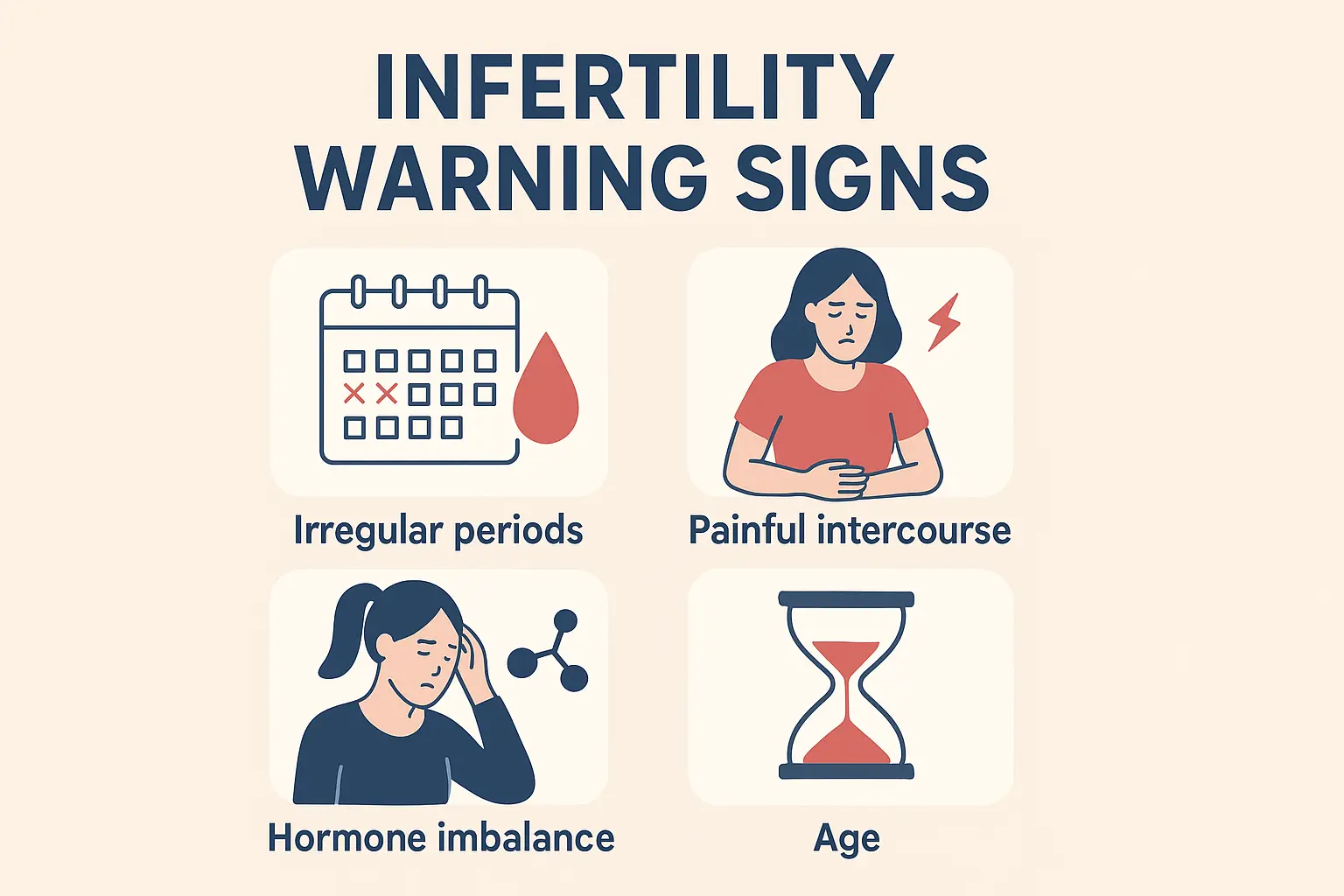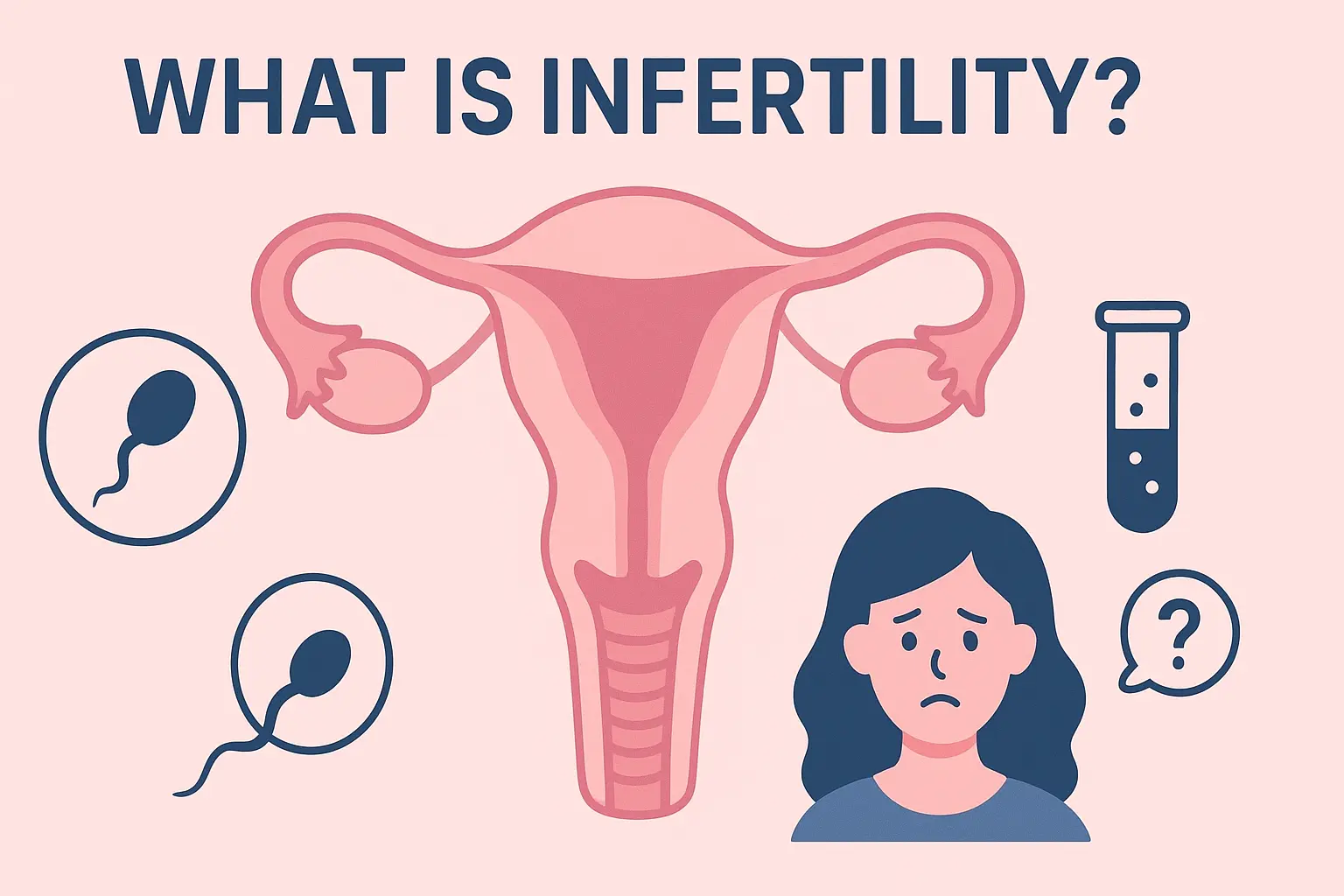Infertility Warning Signs and When to Visit a Fertility Specialist

Infertility is a condition affecting both men and women, in which either partner is struggling to get pregnant, after unprotected sex for over a year. Recognizing infertility warning signs early can help in seeking timely medical advice and improving the chances of conception. Affecting millions of people worldwide, infertility happens due to various reasons.
In many cases, treatments can increase the chance of getting pregnant. Recognizing the warning signs in an early stage can help infertile couples to have a positive outcome for the treatments.
In this blog, we’ll be discussing the early signs of infertility in both men and women, what causes it, and how to prevent infertility.
What is Infertility?

Affecting the reproductive system of both men and women, infertility is the inability of a person to conceive successfully after six months to a year of regular unprotected sexual intercourse.
Inability to get pregnant can be due to issues with men, women, or a combination of both, or unknown causes. Infertility can be either primary or secondary. Primary infertility is when a person has never been able to get pregnant, and secondary infertility is when a person has achieved pregnancy before.
Primary infertility can be caused by various reasons, such as age, genetic conditions, hormonal imbalances, or even lifestyle choices. On the other hand, secondary infertility is caused by complications from the previous pregnancy, such as damaged fallopian tubes, endometriosis, fibroids, etc.
Early Signs of Infertility in Women
Infertility in females contributes to about one-third of reported cases of infertility. Here are some of the early indicators of female infertility:
- The primary symptom of female infertility is the inability to get pregnant even after trying actively.
- Irregular or absent periods (anovulation).
- Recurring chronic pelvic pain.
- Severe cramps during menstruation.
- Pain while having sex.
- Changes in appetite, caused by to hormonal imbalance.
- Sudden weight gain or weight loss.
- Low sex drive.
- Dry vagina.
- Disturbed sleep schedule.
- Fatigue and mood swings.
- Hair loss and thinning.
- Anxiety and depression in certain cases.
- Bloating, abdominal pain, diarrhea, nausea, etc.
- Acne breakout and changes in skin.
- Dark, thicker hair growth on the lips, chest, and chin area.
It is not necessary that all these symptoms point towards underlying infertility. In some extreme cases, there might be milky white discharge from the nipples, totally unrelated to breastfeeding.
Early Signs of Infertility in Men
One of the obvious signs of infertility in men, just as in women, is the inability to get a woman pregnant. Male infertility can also cause many psychological and emotional symptoms, such as depression, loss, grief, and a feeling of inadequacy. Some of the common symptoms include:
- Difficulty in maintaining an erection, or erectile dysfunction.
- Low sex drive or reduced libido.
- Problems with ejaculation, such as low semen volume, premature ejaculation, delayed ejaculation, or even absence of ejaculation.
- Pain, swelling, or lumps in the testicles (varicocele).
- Reduced facial or body hair.
- Loss of muscle mass.
- Enlarged breasts or gynecomastia.
- Small, firm, or undescended testicles.
- History of infections, such as mumps after puberty, or untreated sexually transmitted infections.
In some rare cases, infertility in men can also cause an inability to smell, also called anosmia.
Common Causes of Infertility
Infertility in both men and women can be caused by various factors, such as:
- Problems with the quality and quantity of sperm.
- Sperms not reaching the female reproductive organs.
- Certain environmental factors, such as exposure to chemicals, radiation, etc.
- Some medicines for bacterial infections, high blood pressure, and depression.
- Exposure of testicles to heat.
- Cancer treatments such as chemotherapy and radiation can affect fertility.
- Ovulation disorders such as PCOS, hormonal imbalances, etc.
- Exercising too much can sometimes cause infertility.
- Eating disorders.
- Conditions with a uterus, like uterine polyps, tumors in the uterus, etc.
- Damages to the reproductive system.
- Scarring from surgery.
- Sterilization.
When to See a Doctor?
If you are under 35 and have been trying actively to conceive for over a period of 12 months, or if you are over 35 and actively trying to conceive for around six months, you are advised to see a doctor for infertility.
If you have conditions like PCOS, irregular periods, or extremely painful periods, or if you are finding it difficult to maintain an erection, you are required to visit the doctor and get checked for infertility. Also, if you have a history of miscarriages or infertility running through your family line, it is recommended that you visit the doctor sooner.
Diagnosis and Tests for Infertility
There are various tests and methods of diagnosis to test infertility. The most common diagnosis methods include:
- Inspection of the medical and sexual history of both you and your partner.
- A physical examination to check for any physical issues contributing to infertility.
- Hormone testing is conducted for women, including FSH, LH, AMH, progesterone, and prolactin.
- Tracking of ovulation in females, and confirming it through urine or blood tests.
- Imaging tests like pelvic ultrasound, hysterosalpingography, sonohysterography, hysteroscopy, or laparoscopy are conducted in women to find the underlying cause of infertility.
- In men, tests like semen analysis and scrotal ultrasound are carried out.
- Other tests performed for identifying infertility include genetic testing, antisperm antibody tests, and an endometrial biopsy.
Lifestyle and Prevention Tips
Infertility can be prevented to an extent if it is mainly caused by various lifestyle factors. Some of the prevention tips involve:
- Maintaining a healthy weight.
- Consuming a balanced diet.
- Avoid substance abuse.
- Exercising moderately and managing stress.
- Limiting caffeine intake.
- Staying hydrated and reducing the amount of high-glycemic-index foods.
- Taking prenatal vitamins with folic acid content.
- Getting quality sleep.
- Minimizing the exposure to toxins.
You are also advised to get regularly checked for infertility and be mindful of the birth control measures.
Infertility Warning Signs: Final Thoughts
With not-so-obvious signs and symptoms, determining infertility or its causes can be difficult and may go unnoticed for a long time. But educating yourself about the infertility warning signs and getting treated early can increase your chances of getting pregnant. Making changes in the lifestyle can also help couples overcome and prevent infertility to an extent.
Frequently Asked Questions
The most notable symptom of infertility is the inability to get pregnant even after a year of regular, unprotected sex.
Women aged over 35, still not getting pregnant after an active sex life, and people with fertility problems should seek immediate medical assistance.
Fertility in women starts to drop after the age of 30 and can be significantly lower after the age of 35. In men, fertility starts to decrease after 40, though the sperm quality starts to reduce around 35.
Infertility in women is mainly caused by PCOS, thyroid-related issues, and premature ovarian failure.
Research has shown that stress can have a negative impact on pregnancy and fertility, making it difficult for individuals to conceive successfully.
